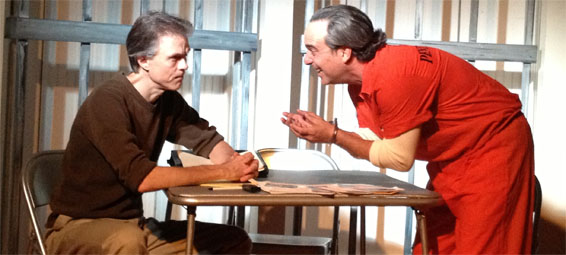When asked where he met two of his victims, serial killer Bill Reach replies with “a mall” and “a carnival.” To watch Down the Road, a one-act play by Lee Blessing, I was sitting inside the community room of the practically deserted ValleyView Center, with a pop-up carnival operating in the parking lot. That chilling coincidence of place and Jason Leyva’s performance as the fame-hungry sociopath are the two bright spots in an otherwise mediocre and muddled production.
Married journalists Dan and Iris Henniman have set up camp in a dingy motel in the middle of nowhere to interview Reach for his official biography. Iris has previously spoken to and written about multiple killers; she sees this as a stepping stone to a byline that’s bigger than the title. Dan, however, is a business journalist, more accustomed to profiling Wall Street criminals than people who literally skewer their victims. They alternate days spent in the jail cell with Reach, one digging into his past and clarifying the points of his crimes while the other wanders the strip mall-and-interstate wasteland that surrounds them.
Despite their professional experience, both Iris and Dan seem wildly out of their depth with Reach. Not only does the way in which the couple interviews a violent killer seem suspect—I sure wouldn’t let him wander around behind me while we’re alone in a room—Reach directs the conversations and playfully manipulates his interviewers, excitedly elaborating when something strikes his fancy or shutting down when they veer toward points he doesn’t want to acknowledge. Alternating between rage-fueled outbursts and a silent, wolfish grin, Leyva commands his scenes with an exhilarating unpredictability.
As Iris and Dan, Natalie Berry and Brad Allen are stiff and transparent. Lacking in the easy back-and-forth of a married couple, they awkwardly trade sexual innuendos when alone in their room, purportedly intent on making a baby. Never quite connecting, it’s hard to shake the sense that each actor is simply waiting for their turn to say a line rather than reacting to their partner. Is this Iris and Dan’s first time working together on a novel? It’s not clear, but the off-handed way in which they listen to each other’s tape-recorded notes and how casually they dismiss seriously worrisome comments and reactions from Reach rob the situation of any real intensity.
As the Hennimans continue to interview Reach, the lazier aspects of Blessing’s script become apparent. Was a psychologist never called in to evaluate this murderer? Didn’t the lawyers dig at least a little more into his past to determine if the 19 women he admitted to killing were all there was? Reach appears awfully eager to show off for the Hennimans, dropping coy hints that there may have been other murders and reiterating that this biography will be his legacy, so they’d better get it right. Why is it left up to Iris to speculate his motives and form a profile, to more or less solve the crime? Supposedly he’s already been in prison for some time—why the sense that we’re watching his defense being built rather than reflecting on the life of a condemned man?
Director Angel Davis has fashioned a surprisingly adequate set within the unusual performance space, with Lily Stapp-Courtney’s jagged and disturbing portraits peering in from behind the bars of Reach’s jail cell. Each scene is intercut with recordings of local news reports and true crime cable shows. It takes a while to realize that these gruesome descriptions are not of Reach’s victims, but other unfortunate women who met horrific ends. A comment on the overall depravity of humans? Perhaps, but it might have been more effective to tie the reports to the situation at hand and add a much-needed layer to Reach’s story.
This play is supposedly meant to be a study on our culture’s fascination with violence, and the creation of celebrities whose noteworthy act is brutal killing. What does it say about us, we’re supposed to wonder, that we’re compelled to learn more about these abhorrent creatures? How does conversing with a convicted killer every day change Iris and Dan? Instead of suitably exploring these themes as promised, Down the Road leaves us with too many questions and not enough answers.
Photo (from left): Natalie Berry, Brad Allen, and Jason Leyva (Courtesy Photo)





